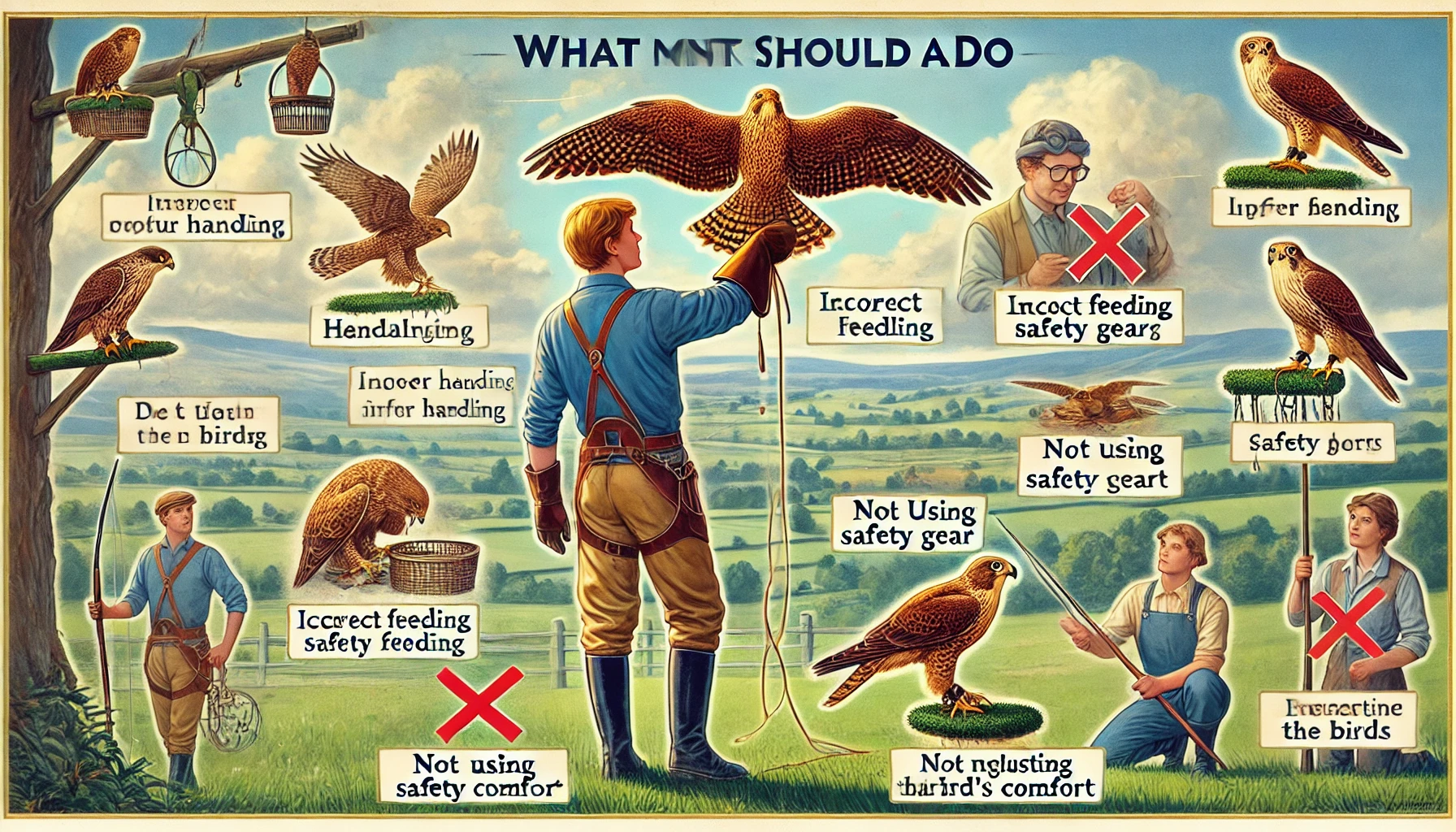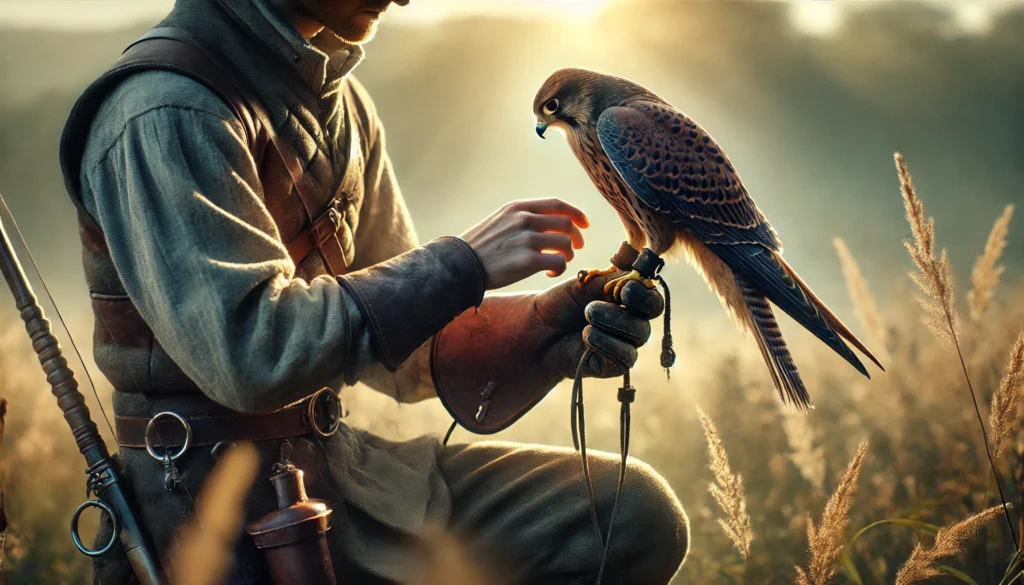Key Insights for Avoiding Common Beginner Mistakes in Falconry
- Learn the Basics Thoroughly: Before starting with falconry, it’s crucial to understand fundamental concepts and techniques.
- Choose the Right Bird: Picking a bird that matches your skill level and temperament is very important. Always consider recommendations from experienced falconers.
- Focus on Safety: Both your safety and the bird’s safety should be a top priority. Use proper equipment and learn how to handle birds correctly.
- Proper Training: Take the time to properly train your bird. This includes commands, exercises, and establishing a bond.
- Patience is Key: Falconry is a practice that requires patience. Rushing through training or handling can result in mistakes.
- Understand the Law: Be aware of and comply with local laws and regulations regarding falconry.
- Continuous Learning: Always be willing to learn and improve. Attend workshops, read books, and seek advice from seasoned falconers.
Avoiding Common Beginner Mistakes in Falconry: An Irish Tale
Picture this: you’re in the lush, green fields of Ireland, looking out over the rolling hills sprinkled with ancient oak trees. Just like a shepherd guiding their flock through the misty countryside, taking up falconry requires careful steps and guidance. And just as our Irish shepherd might make a few missteps leading their sheep through the pastures, beginner falconers can also stumble without the right knowledge.
At Learn Falconry, we’re your friendly guides through the enchanting sport of falconry, helping you navigate the common traps and pitfalls that new falconers often encounter. You might wonder, “What kind of mistakes could I possibly make?” Well, that’s where this article steps in. It’s brimming with handy tips and cautionary tales meant to steer you away from errors that could hamper your falconry journey.
We’ll explore everything from selecting your first bird of prey to setting up proper equipment and establishing a training routine. By keeping this valuable information at your fingertips, you’ll not only boost your confidence but also ensure the wellbeing and safety of your feathered companion. So, if you’re eager to soar high with your bird and avoid any missteps along the way, keep reading’your falconry adventure is about to take flight!
Common Beginner Mistakes in Falconry
Overlooking Proper Equipment
One of the most common beginner falconry mistakes is not using the right equipment. Proper equipment is essential for the safety and well-being of both you and your bird. Many novices might think they can get by with minimal gear, but this can lead to unnecessary challenges and risks. To avoid falconry errors, it’s important to invest in quality gear from the start. You can find detailed information on necessary equipment here: Falconry Equipment.
Misunderstanding Falcon Behavior
Another novice falconry pitfall is misunderstanding falcon behavior. Falcons are complex creatures with specific needs and behaviors. New falconers must spend time learning about their behavior to avoid miscommunication and reinforce positive training outcomes. Visit this resource to better understand falcon behavior: Understanding Falcon Behavior.
Neglecting Proper Training Techniques
One of the biggest falconry beginner mistakes is diving into training without enough knowledge. Proper training techniques are crucial to developing a healthy relationship with your falcon. Many beginners rush through this process, leading to frustration for both the falcon and the trainer. It’s essential to follow structured training methods and patience. Check out these techniques: Training a Falcon.
Underestimating the Commitment Required
Falconry requires a significant time and emotional commitment. Enthusiastic beginners may not fully appreciate the long-term responsibilities involved. This can lead to neglect and poor falcon care. To avoid making such falconry errors, it’s important to be fully aware of the commitment. Learn more about these responsibilities here: Falconry for Beginners.
Lack of Knowledge on Falcon Health and Nutrition
Proper health and nutrition are paramount to a falcon’s performance and longevity. Many beginners might not realize the importance of a balanced diet and regular health check-ups. This is one of the common mistakes in falconry that can have serious consequences for your bird. Gain more insight here: Falcon Health & Nutrition.
Ignorance of Legal Aspects and Licensing
Another frequent beginner falconry mistake is not being fully versed in the legal aspects of falconry. This includes obtaining the necessary permits and understanding the laws and regulations. Ignorance in this area can lead to legal trouble and hinder your falconry practice. Make sure to educate yourself about the legalities here: Legal Aspects of Falconry.
By being aware of these common beginner mistakes and taking steps to avoid them, you can ensure a more successful and rewarding experience with falconry. Remember, knowledge is key, and the resources provided by Learn Falconry can be incredibly beneficial in your journey to becoming a skilled falconer.
Common Beginner Mistakes in Falconry
Incorrect Bird Selection
Choosing the right bird is crucial for beginners. Starting with a species like an eagle is a common mistake. Eagles require specialized care and handling that a novice might not be equipped to provide. A better choice would be a red-tailed hawk, known for its forgiving nature and ease of training.
| Bird Species | Suitability for Beginners | Notes |
|---|---|---|
| Eagle | Not suitable | Requires specialized care |
| Red-tailed Hawk | Suitable | Forgiving and easy to train |
Inadequate Training
Proper training is another essential aspect. Many new falconers underestimate the time and effort required to train a bird. This can lead to frustration and increased risk of accidents.
Poor Nutrition
Falcons and other birds of prey require a specific diet. During the summer molt, neglecting their dietary needs can lead to severe health issues. Ensure their diet includes adequate protein, quality water, and a variety of foods.
| Season | Dietary Focus |
|---|---|
| Summer Molt | Special care and nutrition |
| Regular Periods | Adequate protein and water |
Insufficient Handling
Handling your bird too much or too little can cause stress. Proper handling techniques are crucial to ensure the bird’s well-being and effectiveness.
Lack of Regulation Awareness
Falconry is highly regulated. Not following the guidelines can result in severe consequences like license revocation or fines. Stay informed and updated with the laws and regulations.
Inadequate Equipment
Using poor quality or poorly maintained equipment can be dangerous for both the falconer and the bird. Ensure your equipment is in good condition and regularly inspected.
Inadequate Habitat
Providing a suitable habitat is essential. Birds need proper enclosures, adequate space, and a balanced environment.
| Habitat Requirement | Description |
|---|---|
| Enclosures | Secure and spacious |
| Environment | Balanced and stimulating |
Inadequate Veterinary Care
Regular veterinary check-ups are a must. Neglecting this can lead to undetected health issues, negatively impacting the bird’s performance and health.
Inadequate Permitting and Regulation
Understanding and abiding by the complex permitting process is crucial. Ensure compliance with local and national laws to avoid fines and penalties.
Financial Investment
Falconry can be an expensive pursuit. Budget for equipment, mews construction, and ongoing bird care expenses.
Finding a Sponsor
Connect with an experienced sponsor who can guide you. A mentor is essential in navigating the nuances and challenges of falconry.
Understanding Population Dynamics
Make sure to take birds from sustainable sources and understand the importance of population dynamics and regulations around wild bird capture.
By understanding these common pitfalls, you can better prepare yourself for the rewarding experience of falconry.
Avoiding Common Beginner Mistakes in Falconry
Falconry can be a thrilling and rewarding pursuit, but it’s important to steer clear of common errors that many beginners make. Selecting the wrong bird, like an eagle, or not providing enough training can lead to problems. Instead, start with a species like the red-tailed hawk, which is more suitable for novices. Proper care, such as ensuring good nutrition, adequate vet visits, and providing a suitable habitat, are also key.
Handling your bird appropriately and regularly maintaining your equipment are crucial to avoid stress and mishaps. Remember, falconry is heavily regulated, so staying updated with the rules is essential to avoid penalties or loss of licenses.
By following these guidelines and being prepared for the time and financial commitments, you can enjoy a safer and more successful journey in the captivating world of falcony.



